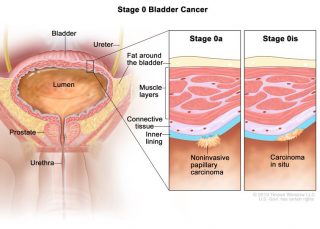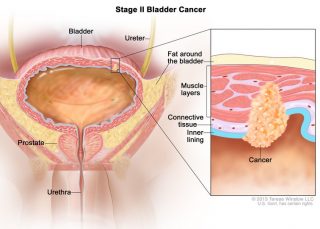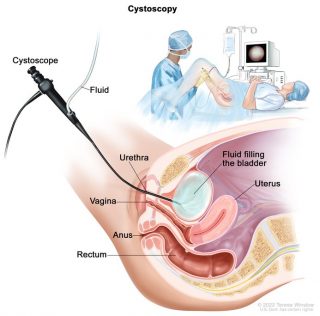Bladder Cancer
Bladder cancer is the 6th most common cancer in the United States. Around 2% of Americans will be diagnosed with bladder cancer at some point in their lives. Patients that smoke or work in certain types of factories or with certain hazardous chemicals are at increased risk of developing bladder cancer.
Symptoms of bladder cancer include blood in the urine, pain with urination, frequency/urgency of urination, involuntary leakage of urine, and/or unexpected weight loss.
Cystoscopy – Patient’s suspected of having bladder cancer undergo a procedure known as cystoscopy. Cystoscopy is an office-based procedure in which a soft flexible telescope is passed down the urethra and into the bladder. If a tumor is found, then the tumor will need to be removed so that it can be examined under a microscope.
Bladder biopsy and fulguration is an office procedure for removal of small tumors. It is sometimes performed in the office, and sometimes performed at a surgery center or hospital. If performed in the office, it can be performed with nitrous oxide, to help with patient anxiety and discomfort. A soft flexible hollow tube (cystoscope) equipped with a lens is inserted into the urethra and slowly advanced into the bladder. Biopsy forceps are passed through the cystoscope to sample any abnormal appearing tissue within the bladder (bladder biopsy). After tissue is obtained, the biopsy site is cauterized to stop any bleeding (fulguration). The removed tissue is then removed and sent for analysis
Transurethral resection of a bladder tumor is procedure performed in the operating room with the use of general anesthesia – it is generally reserved for larger and/or more complex bladder tumors. A telescope is inserted into the bladder. An electric wire is passed through the telescope and used to “shave out” the abnormal bladder tissue. The removed tissue is then removed and sent for analysis. A foley catheter is often left in the bladder for 1-2 weeks to allow the bladder to heal. The catheter is removed in the office.
Cystectomy/Urinary Diversion Cystectomy is a surgical procedure performed in a hospital in which the entire urinary bladder is removed. This procedure is generally reserved for more aggressive forms of bladder cancer. Urinary diversion is then performed to re-route urine drainage.




